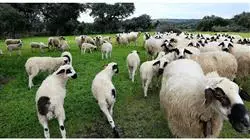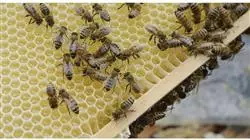University certificate
The world's largest faculty of veterinary medicine”
Introduction to the Program
We offer you the most comprehensive training in the market to bring Extensive Livestock Management to the same level as clinical and sanitary practice, offering your clients the highest quality in both services"

The Master's Degree in Extensive Livestock Management has a comprehensive program that covers the widest spectrum of species and breeds used in Animal Production Not only are the most common productions, such as those derived from cattle, sheep, goats, pigs and classic poultry farming, given in-depth and specialized attention, but also other much less common but highly relevant productions are incorporated, such as beekeeping or hunting productions, which demand a greater degree of specialization from professionals in the area.
Likewise, the level of knowledge and professional experience of the course professors allows them to address very specific productions, such as those related to lidia cattle, where it is very difficult to access levels of specialization, except for the small number of people who have had the opportunity to develop their knowledge within the scope of this type of livestock farming.
Equine production, which is usually neglected in other programs of this type, is also in great demand for specialized professionals at the highest level, especially in the production of animals for sports disciplines, which are in high demand and have a very high market value.
The high levels of knowledge provided by the faculty in the areas of economics, genetics and animal breeding contribute decisively to consolidate and expand knowledge in two areas that are absolutely fundamental to achieve success in the management of extensive livestock production.
Immerse yourself in this high quality educational training, which will enable you to meet the future challenges of Extensive Livestock Management "
This Master's Degree in Extensive Livestock Management contains the most complete and up-to-date scientific program on the market. The most important features include:
- The development of case studies presented by experts in the management of veterinary centers
- The graphic, schematic, and practical contents with which they are created, provide scientific and practical information on the disciplines that are essential for professional practice
- New developments in Extensive Livestock Management
- Practical exercises where self-assessment can be used to improve learning
- Special emphasis on innovative methodologies in Extensive Livestock Management
- Theoretical lessons, questions to the expert, debate forums on controversial topics, and individual reflection assignments
- Content that is accessible from any fixed or portable device with an Internet connection
In this Master's Degree you will study in depth the knowledge of the main cattle breeds exploited in extensive beef production"
It includes, in its teaching staff, professionals belonging to the field of Extensive Livestock Management , who bring to this training the experience of their work, in addition to recognized specialists from prestigious leading societies and universities.
The multimedia content, developed with the latest educational technology, will provide the professional with situated and contextual learning, i.e., a simulated environment that will provide immersive learning programmed to study in real situations.
This program is designed around Problem-Based Learning, whereby the specialist must try to solve the different professional practice situations that arise throughout the program. To do so, the professional will be assisted by an innovative interactive video system created by recognized experts in Extensive Livestock Management .
This program comes with the best educational material, providing you with a contextual approach that will facilitate your learning"

This 100% online Master's Degree will allow you to combine your studies with your professional work while increasing your knowledge in this field"
Why study at TECH?
TECH is the world’s largest online university. With an impressive catalog of more than 14,000 university programs available in 11 languages, it is positioned as a leader in employability, with a 99% job placement rate. In addition, it relies on an enormous faculty of more than 6,000 professors of the highest international renown.

Study at the world's largest online university and guarantee your professional success. The future starts at TECH”
The world’s best online university according to FORBES
The prestigious Forbes magazine, specialized in business and finance, has highlighted TECH as “the world's best online university” This is what they have recently stated in an article in their digital edition in which they echo the success story of this institution, “thanks to the academic offer it provides, the selection of its teaching staff, and an innovative learning method aimed at educating the professionals of the future”
A revolutionary study method, a cutting-edge faculty and a practical focus: the key to TECH's success.
The most complete study plans on the university scene
TECH offers the most complete study plans on the university scene, with syllabuses that cover fundamental concepts and, at the same time, the main scientific advances in their specific scientific areas. In addition, these programs are continuously being updated to guarantee students the academic vanguard and the most in-demand professional skills. In this way, the university's qualifications provide its graduates with a significant advantage to propel their careers to success.
TECH offers the most comprehensive and intensive study plans on the current university scene.
A world-class teaching staff
TECH's teaching staff is made up of more than 6,000 professors with the highest international recognition. Professors, researchers and top executives of multinational companies, including Isaiah Covington, performance coach of the Boston Celtics; Magda Romanska, principal investigator at Harvard MetaLAB; Ignacio Wistumba, chairman of the department of translational molecular pathology at MD Anderson Cancer Center; and D.W. Pine, creative director of TIME magazine, among others.
Internationally renowned experts, specialized in different branches of Health, Technology, Communication and Business, form part of the TECH faculty.
A unique learning method
TECH is the first university to use Relearning in all its programs. It is the best online learning methodology, accredited with international teaching quality certifications, provided by prestigious educational agencies. In addition, this disruptive educational model is complemented with the “Case Method”, thereby setting up a unique online teaching strategy. Innovative teaching resources are also implemented, including detailed videos, infographics and interactive summaries.
TECH combines Relearning and the Case Method in all its university programs to guarantee excellent theoretical and practical learning, studying whenever and wherever you want.
The world's largest online university
TECH is the world’s largest online university. We are the largest educational institution, with the best and widest online educational catalog, one hundred percent online and covering the vast majority of areas of knowledge. We offer a large selection of our own degrees and accredited online undergraduate and postgraduate degrees. In total, more than 14,000 university degrees, in eleven different languages, make us the largest educational largest in the world.
TECH has the world's most extensive catalog of academic and official programs, available in more than 11 languages.
Google Premier Partner
The American technology giant has awarded TECH the Google Google Premier Partner badge. This award, which is only available to 3% of the world's companies, highlights the efficient, flexible and tailored experience that this university provides to students. The recognition as a Google Premier Partner not only accredits the maximum rigor, performance and investment in TECH's digital infrastructures, but also places this university as one of the world's leading technology companies.
Google has positioned TECH in the top 3% of the world's most important technology companies by awarding it its Google Premier Partner badge.
The official online university of the NBA
TECH is the official online university of the NBA. Thanks to our agreement with the biggest league in basketball, we offer our students exclusive university programs, as well as a wide variety of educational resources focused on the business of the league and other areas of the sports industry. Each program is made up of a uniquely designed syllabus and features exceptional guest hosts: professionals with a distinguished sports background who will offer their expertise on the most relevant topics.
TECH has been selected by the NBA, the world's top basketball league, as its official online university.
The top-rated university by its students
Students have positioned TECH as the world's top-rated university on the main review websites, with a highest rating of 4.9 out of 5, obtained from more than 1,000 reviews. These results consolidate TECH as the benchmark university institution at an international level, reflecting the excellence and positive impact of its educational model.” reflecting the excellence and positive impact of its educational model.”
TECH is the world’s top-rated university by its students.
Leaders in employability
TECH has managed to become the leading university in employability. 99% of its students obtain jobs in the academic field they have studied, within one year of completing any of the university's programs. A similar number achieve immediate career enhancement. All this thanks to a study methodology that bases its effectiveness on the acquisition of practical skills, which are absolutely necessary for professional development.
99% of TECH graduates find a job within a year of completing their studies.
Master's Degree in Extensive Livestock Management
The Master's Degree in Extensive Livestock Management at TECH Global University has been designed by leading experts in the field, giving you the opportunity to access high-quality content. Throughout the program, we will enhance your skills through an innovative audiovisual system that will help you quickly and easily absorb the various themes covered in each lesson. Our goal with this innovative 1,500-hour postgraduate program is to provide you with a solid conceptual foundation, enabling you to tackle topics such as species production, conservation programs for endangered livestock populations, and effective economic management of the sector.
Pursue a postgraduate degree in extensive livestock management
In this program from the Faculty of Veterinary Medicine at TECH, you will find an updated curriculum designed to help you develop specialized knowledge across a range of areas, including population management for at-risk species, biodiversity, extensive production systems, and classical poultry farming, among other important thematic approaches that will be invaluable to your professional practice. Upon successful completion of the program, you will earn a prestigious and internationally recognized professional qualification.







